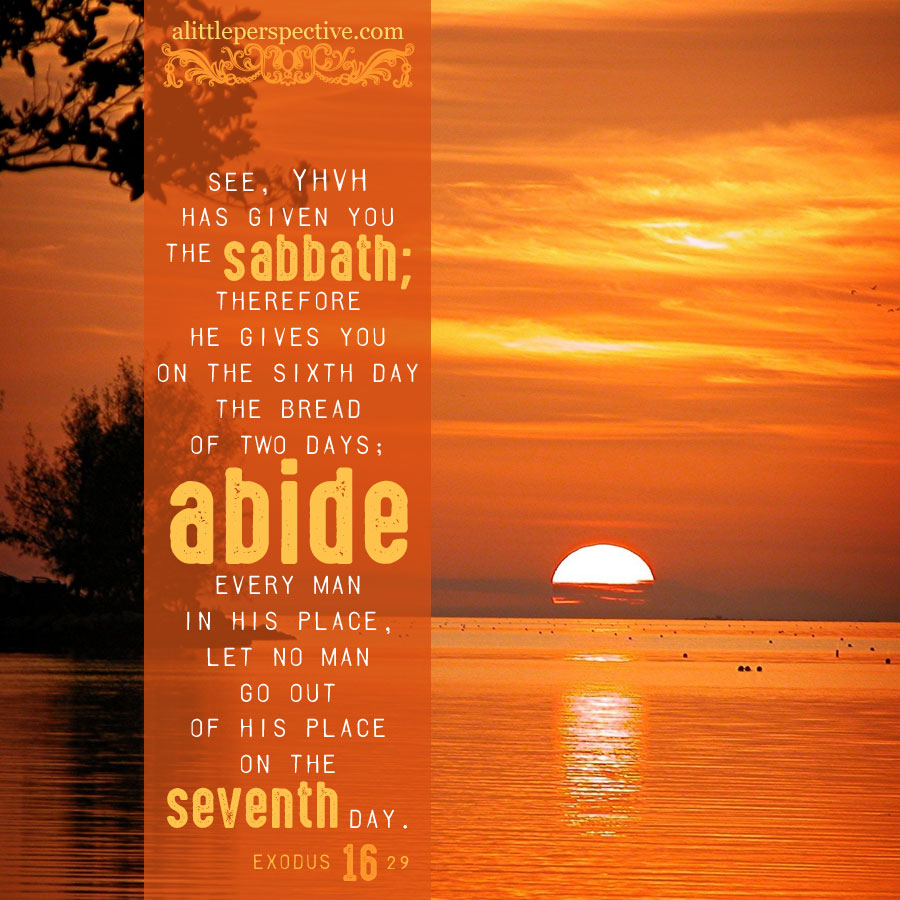Previously: who are the children of israel
We have already learned that the Sabbath day is a day of rest, of remembering and acknowledging YHVH God as Creator of heaven and earth (since He rested from His act of creation on the seventh day), and incidentally, that as our Creator, we owe Him worship and service. The flip side of rest on the seventh day, is to do no work on the seventh day.
“But the seventh day is a sabbath of the LORD your God; in it you shall not do any work, you or your son or your daughter, your male or your female servant or your cattle or your sojourner who stays with you. For in six days the LORD made the heavens and the earth, the sea and all that is in them, and rested on the seventh day; therefore the LORD blessed the sabbath day and made it holy.” Exo 20:10-11
“Speak to the sons of Israel and say to them, ‘The LORD’S appointed times which you shall proclaim as holy convocations–My appointed times are these: ‘For six days work may be done, but on the seventh day there is a sabbath of complete rest, a holy convocation. You shall not do any work; it is a sabbath to the LORD in all your dwellings.” Lev 23:2-3
“You shall not bring a load out of your houses on the sabbath day nor do any work, but keep the sabbath day holy, as I commanded your forefathers.” Jer 17:22
But what, according to God’s dictionary (the Old Testament) defines “work”?
The word is melakah in Hebrew, and means “deputyship” first. This is interesting. If there is a deputy, then there is a sheriff, or one higher in rank and authority, who has delegated his authority to his deputy. I believe the word for “work” meaning “deputyship” is referring to God’s command to Adam (and by implication, all men after him) in the Garden: to subdue the earth and have dominion over all the living things on the earth. For dominion belongs properly to God as Creator, but in the Garden He made man His deputy, and delegated dominion to him.
Besides deputyship, melakah also means employment or any abstract or concrete work; occupation, business, property as a result of labor; workmanship or craftsmanship, or public, political, or religious business or service.
I take that to mean, first, that of course we should not work at whatever our daily labor is: the job or career for the men, or the housework, laundry, cooking, homeschooling or home business for the women. Also, gardening or caring for and improvement of property comes under the definition of work. So do hobbies such as sewing, quilting, or furniture making, since that all involves craftsmanship. And even government and church business is included in the definition of work.
But Jesus taught us that it is lawful to do good on the Sabbath, and of course, to care for dependents. My first rule of thumb for myself is that since the Sabbath is a set apart day, doing my daily labor, that which I could easily do and ought to do on any other day, I will not do on the Sabbath.
As for why the command to do no work: I have a theory on why this is so important to God. Work, painful toil, daily labor to provide for needs, is the punishment Adam received upon himself as a result of sin and his disobedience to God. We earned work for ourselves as a result of sin. The ease of life in the Garden, in the presence of God, went away.
But even before this happened, God instituted a day of rest from work. In other words, even before the Fall, God made provision for the result of the Fall in the Sabbath day of rest. He has given us a day of respite from painful toil. And out of compassion that we no longer live in His presence while we are laboring, He has given us a day of release and freedom from responsibilities, so that we may seek His presence. The Sabbath is His first moedim, or appointment made with man. If we seek Him in His appointed time, He makes Himself available to find.
As such, the Sabbath is the foundational prophetic picture of salvation. We cannot earn salvation by working, but He bestows His grace on us so that we may rest in His finished work. Every time we keep the Sabbath day of rest and do no work in it, we are prophetically proclaiming our salvation in our way of life.
Again, we realize we have a promise of the reign of Messiah Yeshua for 1000 years. It will be a millennium of rest for the earth, and freedom from sin and injustice. If we look at the chronology of the Old Testament, and take its historical statements about itself as truth, we see that 4000 years transpired from Adam to Yeshua, and 2000 years from Yeshua to the present … for a total of 6000 years. For six millennia, the earth has labored, groaned, under the weight of sin (Rom 8:19-22). The seventh millennium under the kingship of Messiah Yeshua will be the millennium of rest … Amen! Come, Lord Jesus!
Continued: sabbath: saturday to sunday

















Leave a Reply